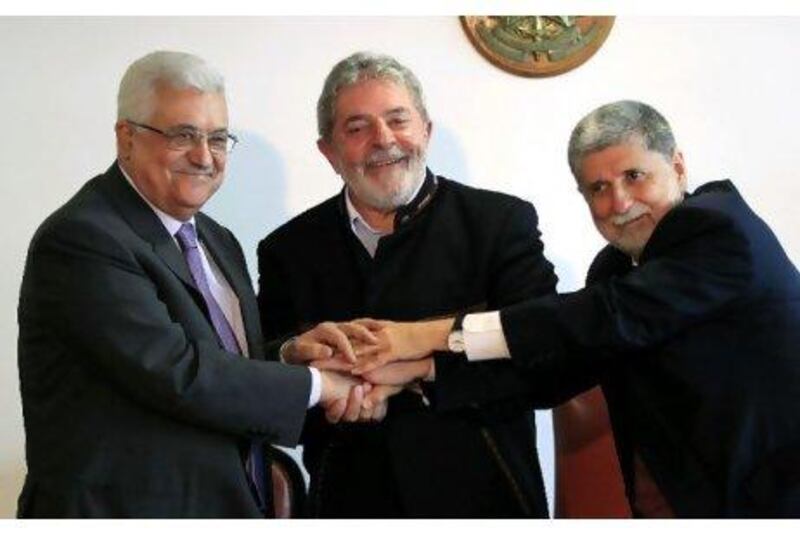SANTIAGO // When the latest round of direct negotiations with Israel stalled, the Palestinian Authority turned its attention to securing help some 10,000km away from the Middle East.
In the past month a wave of support has emerged across Latin America as its heavyweight Brazil, along with Argentina, Bolivia, Ecuador and Uruguay, have proclaimed they formally recognise an independent Palestinian state based on 1967 borders.
They join about 100 countries that already recognise a Palestinian state.
The focus is now shifting to Paraguay and Chile in particular - home to the largest population of Palestinians outside of the Middle East - and its president, Sebastian Pinera, who is reportedly meeting his advisers this week to consider whether to follow suit.
Representatives of the estimated 300,000 Chileans of Palestinian descent, including four senators and a number of deputies, are cautiously optimistic that years of lobbying within the Andean nation will bear fruit in 2011.
In November at a speech at the Palestinian Club of Chile, Mr Pinera said he supported an independent Palestinian state and added that he planned to visit soon, but was careful not to mention the borders.
This week Mr Pinera met the Palestinian Authority's president, Mahmoud Abbas, when both leaders attended the inauguration of Dilma Rousseff, Brazil's first female president. Mr Abbas took the opportunity to thank leaders from the region for recognising a Palestinian state with Brazil being the first country in the region to build a Palestinian Embassy.
"We have been doing a lot of meetings and a lot of work and a lot of declarations and we also have put some pressure on the foreign affairs minister and also on the president to recognise the Palestinian state with borders," said Mauricio Abu Ghosh, the president of the Palestinian Federation in Chile. "For us, that is the only way. Without borders, it is better to do nothing."
The rush of support from Latin America follows intense lobbying from the Palestinian Authority, which hopes that an increasing number of countries recognising its statehood with borders from before the 1967 war, during which Israel captured East Jerusalem, the West Bank and the Gaza Strip, will give it leverage at the negotiating table.
For the Latin American nations, the decision to unilaterally recognise the Palestinian state is motivated by their own global ambitions as well as domestic pressures.
Led by Brazil, which is now flexing its muscles on the international stage, these countries, particularly those within Mercosur, or the Southern Common Market, are seizing "a new opportunity to develop a protagonistic role in the conflict between Palestinians and Israelis," said Jorge Castro, the director of Argentina's Strategic Planning Institute. "This is a diplomatic movement with the Brazilian leadership," Mr Castro said. "Brazil has become an important global actor in the last eight years in political and economic aspects and it is developing an international policy in the Middle East."
"It is because Brazil and Argentina are moving in their international politics to have a different perspective from the United States," said Rodrigo Karmy, a Middle East politics professor with the Centre of Arabic Studies at the Universidad de Chile.
He adds that the large Arab expatriate communities in these nations - Brazil is home to nearly four million Arab expatriates while Argentina hosts 1.8 million - makes the peace process "an important political issue for these countries", Mr Karmy said.
For Chile, led by a right-wing government that wants to remain cosy with the United States, the matter of Palestinian recognition is more complicated, Mr Karmy said.
Pressures across the political spectrum in the Chilean parliament are mounting on Mr Pinera, whose second-in-command, Rodrigo Hinzpeter, is Jewish.
Chile's Palestinians are also firmly established in all aspects of life there. Since the 1850s there have been multiple waves of immigrants from the Palestinian Territories, the overwhelming majority Christians from Bethlehem, Beit Jala and Beit Sahour.
The influence is most obvious in the Patronato neighbourhood in downtown Santiago, where textile stores are a reminder of the early business investment in the country.
Shops selling shawarma, kebabs, shisha pipes and Arabic sweets line one section of the historic neighbourhood, some with Palestina Libre stickers displayed in their windows.
"We are hoping to do the same as Brazil and Argentina," said Majle Abu Yerer, the president of the Palestinian student union in Chile. He recently donned a Free Palestine T-shirt and with a group of about eight handed out pamphlets to passers by in Santiago city centre. "There is no other way than unilateral."
Mr Pinera also faces pressure to show solidarity with his Latin American counterparts or risk isolation, Mr Karmy said.
Whether the wave of support from these countries will have any impact remains to be seen.
The United States called the decision by Brazil and Argentina "premature" while Israel said it would harm the negotiations.
That opinion is supported by Gabriel Zaliasnik, the president of the Jewish community in Chile.
"My belief is that this is a very bad decision for Palestinians themselves," he said. "It is delusional to think that you can achieve statehood without direct negotiations with Israel.
"They are only showing Israel and the world that they are not serious about negotiations."





